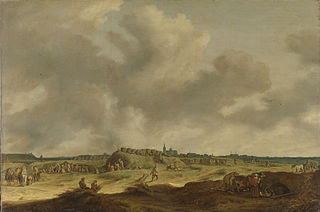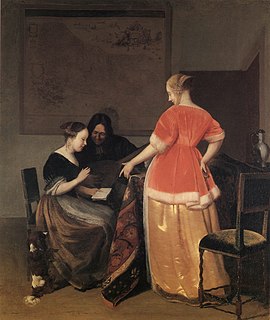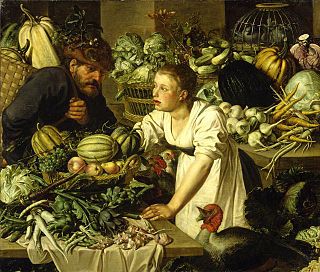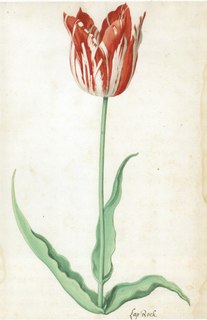

Pieter Bor, or Pieter Christiaensz Bor (1559-1635) was a Dutch Golden Age writer and historian. His portrait was painted by Frans Hals in 1634, and it was engraved for his book in 1637.


Pieter Bor, or Pieter Christiaensz Bor (1559-1635) was a Dutch Golden Age writer and historian. His portrait was painted by Frans Hals in 1634, and it was engraved for his book in 1637.
He was born in Utrecht (city) and settled in Haarlem in 1578, where he became a public notary. He moved in 1591 to Leiden, where he is registered as being a notary. He is also registered as having lived and worked in The Hague, Rijswijk, and Beverwijk, before returning to Haarlem, in 1602, where he received an annuity from the Staten General for his history writing. Through his work, he had access to city archives in the places he stayed, and he transcribed these sources for his history writing.
Although he is not registered as a member of a Chamber of Rhetoric, he wrote a few plays that were published in 1617. This stapelspel is based on the same story as Shakespeare's Pericles, Prince of Tyre. This work, which occupied him for 25 years (according to the introduction), was never finished in rhyme, necessary for performances in those days.
He is best known for the historical work he wrote during his years traveling through various cities, called Origin, Beginning, and Continuation of the Dutch Wars (Dutch title: Oorsprongk, Begin, en Vervolgh der Nederlantsche Oorlogen). This work, which was published in 37 installments from 1595-1601, is one of the longest publications generated in the 17th century. It was consolidated and published in 8 volumes in Amsterdam in 1679 and forms an important historic resource for the Dutch Revolt. Bor was a perfectionist who was careful to include both sides to every battle, transcribing documents from both the Dutch rebels and the Spanish Catholics. Many of the original documents have since been lost. [1]
In his history, Bor also wrote descriptions of non-military accomplishments such as the last trip to Novaya Zemlya by Willem Barentz.

Emanuel van Meteren or Meteeren was a Flemish historian and Consul for "the Traders of the Low Countries" in London. He was born in Antwerp, the son of Sir Jacobus van Meteren, Dutch financier and publisher of early English versions of the Bible, and Ottilia Ortellius, of the famous Ortellius family of mapmakers, and nephew of the cartographer Abraham Ortelius.

Nicolaes Pieterszoon Berchem was a highly esteemed and prolific Dutch Golden Age painter of pastoral landscapes, populated with mythological or biblical figures, but also of a number of allegories and genre pieces.

Willem Claesz. Heda was a Dutch Golden Age artist from the city of Haarlem devoted exclusively to the painting of still life. He is known for his innovation of the late breakfast genre of still life painting.

Karel van Mander (I) or Carel van Mander I was a Flemish painter, poet, art historian and art theoretician, who established himself in the Dutch Republic in the latter part of his life. He is mainly remembered as a biographer of Early Netherlandish painters and Northern Renaissance artists in his Schilder-boeck. As an artist and art theoretician he played a significant role in the spread and development of Northern Mannerism in the Dutch Republic.

Jan Lievens was a Dutch Golden Age painter who was associated with his close contemporary Rembrandt, a year older, in the early parts of their careers. They shared a birthplace in Leiden, training with Pieter Lastman in Amsterdam, where they shared a studio for about five years until 1631. Like Rembrandt he painted both portraits and history paintings, but unlike him Lievens' career took him away from Amsterdam to London, Antwerp, The Hague and Berlin.

The Bentvueghels were a society of mostly Dutch and Flemish artists active in Rome from about 1620 to 1720. They are also known as the Schildersbent.

Pieter Langendijk was a damask weaver, city artist, dramatist, and poet.

Samuel Ampzing was a Dutch minister, poet and purist.

Pieter Claesz Soutman was a Dutch Golden Age painter and printmaker from Haarlem.

Jacob van der Ulft was a Dutch painter, glass painter, print artist, architect and mayor. He was known for his architectural and city views, landscapes and topographical views.

Pieter de Neyn, or Deneyn was a Dutch Golden Age painter.

Willem Thibaut, Tybaut, or Tibout (1524–1597), was a Dutch Golden Age painter.

Theodorus Schrevelius was a Dutch Golden Age writer and poet.

Jan de Visscher, was a Dutch Golden Age engraver who became a painter in later life.

Jacob Ochtervelt, was a Dutch Golden Age painter.

Pieter Cornelisz van Rijck, was a Dutch Golden Age painter.

Jan Wouwerman, was a Dutch Golden Age painter.

Adriaan van der Willigen was a Dutch writer of plays and travelogues who is mostly remembered today for his comprehensive list of painter biographies.

Pieter Holsteyn, was a Dutch Golden Age watercolor painter and engraver.

Adrianus Tegularius (1605–1654) was a theologian from the Northern Netherlands best known today for his portrait by Frans Hals.
| Wikimedia Commons has media related to Pieter Bor . |